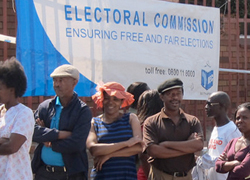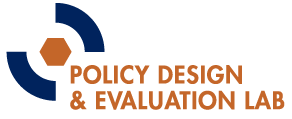Voter Turnout in South Africa
Researchers: Clark Gibson (UC San Diego), Karen Ferree (UC San Diego), and Craig McIntosh (GPS)
Location: South Africa
 Short message service (SMS) blasts were used to increase voter turnout in South Africa, as the first nationwide get-out-the-vote experiment in a developing country. It tests whether African turnout reflects not just direct mobilizing efforts of parties and official electoral organizations, but also social pressures to vote. The project used SMS texting during the South African national elections in April 2014 to reach millions of citizens, making it larger than any get-out-the-vote experiment ever conducted. Many different kinds of civic and social-norm messages using SMS issued by the official electoral body in the country, as well as their effect on turnout, were tested.
Short message service (SMS) blasts were used to increase voter turnout in South Africa, as the first nationwide get-out-the-vote experiment in a developing country. It tests whether African turnout reflects not just direct mobilizing efforts of parties and official electoral organizations, but also social pressures to vote. The project used SMS texting during the South African national elections in April 2014 to reach millions of citizens, making it larger than any get-out-the-vote experiment ever conducted. Many different kinds of civic and social-norm messages using SMS issued by the official electoral body in the country, as well as their effect on turnout, were tested.
PDEL funded initial preparatory meetings to initiate the larger project. The project sought to:
- create a multi-channel platform using various digital media and information technology in order to recruit, register and engage with citizens for information push and pull via the platform;
- measure citizens against professional monitors;
- use the platform to deploy citizen monitors on election day.
The research team is currently working on the data from the 2014 elections to produce robust and policy-relevant information about the use of information technology and digital media to foster engagement in electoral processes.
To date, the project has successfully:
- developed different digital platforms to engage South African citizens in their 2014 national election,
- engaged with thousands of South African citizens throughout the election campaign period and on election day,
- recruited citizen monitors through these platforms,
- gathered survey and demographic data on the users in order to make inferences about which platform, message and incentive scheme worked best,
- conducted election-day experiments aimed at increasing electoral efficiency by employing professional and citizen monitors,
- generated evidence that the experiments did improve administrative performance,
- gathered data about citizens’ election-day experiences, and
- worked with domestic South African organizations to construct and implement the project.
It is difficult at this stage of analysis to report failures. Though we have data for every aspect of the project, we do not yet know if every aspect of the project has generated reliable data.

 Short message service (SMS) blasts were used to increase voter turnout in South Africa, as the first nationwide get-out-the-vote experiment in a developing country. It tests whether African turnout reflects not just direct mobilizing efforts of parties and official electoral organizations, but also social pressures to vote. The project used SMS texting during the South African national elections in April 2014 to reach millions of citizens, making it larger than any get-out-the-vote experiment ever conducted. Many different kinds of civic and social-norm messages using SMS issued by the official electoral body in the country, as well as their effect on turnout, were tested.
Short message service (SMS) blasts were used to increase voter turnout in South Africa, as the first nationwide get-out-the-vote experiment in a developing country. It tests whether African turnout reflects not just direct mobilizing efforts of parties and official electoral organizations, but also social pressures to vote. The project used SMS texting during the South African national elections in April 2014 to reach millions of citizens, making it larger than any get-out-the-vote experiment ever conducted. Many different kinds of civic and social-norm messages using SMS issued by the official electoral body in the country, as well as their effect on turnout, were tested.